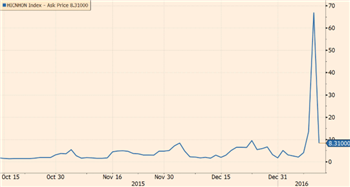(单词翻译:单击)

The overnight CNH-Hibor rate has finally plummeted after two record highs, suggesting the People’s Bank of China feels it has made its point to investors and things can now return to normal.
在两次升至创纪录高度之后,隔夜香港人民币银行同业拆借利率(CNH-Hibor)终于大跌,这暗示,中国央行(PBoC)在成功收窄在岸和离岸人民币汇率价差之后,已把自己的意图传递给了投资者,局面可能会回归常态了。
The rate is the overnight borrowing cost, between banks, for offshore renminbi, chiefly in Hong Kong. It’s not too widely cited but this week took on massive importance when it spiked, first jumping 939 basis points to a record-high 13.4 per cent on Monday, and then sky-rocketing to 67 per cent on Tuesday. Today it returned to 8.31 per cent, which is still more than double the six-month average of 3.82 per cent.
CNH-Hibor是离岸人民币、主要是香港人民币的银行间隔夜借款成本。Hibor未被广泛引用,但本周,它体现出了相当大的重要性。它先是周一大涨939个基点、升至13.4%的创纪录高度,然后周二飙升至67%。今天,Hibor回落至8.31%,这仍是6个月均值3.82%的两倍多。
The sharp increase indicated the market for CNH, or offshore renminbi, had dried up as the central bank mopped up liquidity to narrow the widening gap between the renminbi’s offshore and onshore rates. By heavily reducing the supply of CNH, shorting the renminbi – which involves borrowing the currency at market rates – became prohibitively expensive.
Hibor大幅升高表示,随着中国央行吸收流动性,以缩小不断扩大的离岸人民币(CNH)和在岸人民币之间的差价,CNH发生了干涸。通过大幅降低CNH的供应,做空人民币——涉及以市场价借入人民币——的成本高得异乎寻常。
“Speculators aggressively betting against the CNY via the CNH were punished by exorbitantly high Hibor rates for the CNH,” said analysts at DBS in a note on Wednesday.
“由于借入CNH的Hibor高得厉害,大肆通过CNH做空在岸人民币(CNY)的投机者受到了惩罚,”新加坡星展银行(DBS)的分析师周三发表报告称。
CNH-Hibor is set each day at 11:15am local time, by averaging rates sent in from banks authorised to submit quotes. Within minutes of the rate spike on Tuesday, the offshore and onshore renminbi rates converged, for the first time since October.
Hibor是在当地时间每天上午11:15根据获授权提供报价的银行提出的利率平均值设定的。周二,Hibor飙升几分钟之后,人民币离岸和在岸汇率自2009年10月以来第一次趋于一致。
After this show of force, it’s likely many short-sellers will second guess the risk-reward scenario of betting on a decline in China’s currency.
这次力量展示之后,许多做空者很可能将对押注人民币下跌的风险报酬做一番事后诸葛。
“The central bank can easily exert influence in the CNH market, against a small and declining pool of CNH liquidity (about RMB1.5-2tn) and with the suspension of onshore-to-offshore funding links,” noted HSBC analysts in a note today. “Speculative interests, given their leveraged nature, are likely to be expressed in the forward curve, rather than with cash transactions in spot. As such, they can be very vulnerable to a rise in overnight CNH funding costs.”
“由于CNH流动性(约1.5万亿至2万亿元人民币)不大且不断缩小,且从在岸到离岸的融资渠道暂时切断,中国央行可以轻而易举地对CNH市场施加影响,”汇丰(HSBC)分析师在今天的报告中指出,“由于带有杠杆特点,投机性力量可能会表现为远期价格曲线,而不是现金现货交易。这样一来,隔夜CNH融资成本升高可能会对他们造成很大影响。”
The tug-of-war between speculators and the PBoC isn’t over, but it’s not a surprise that rates were pulled back today.
投机者与中国央行之间的拉锯战并未结束,但Hibor被拉低,不会令人感到意外。
Meanwhile, banks in Hong Kong are offering higher interest rates on renminbi deposits, indicating banks are willing to pay a premium to hold China’s currency. Here’s a good chart from Nomura:
另一方面,香港的银行为人民币存款提出了更高的利率,表明他们愿意为持有人民币支付溢价。


